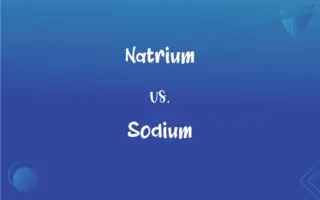Gatorade vs. PowerAde: What's the Difference?
Edited by Aimie Carlson || By Harlon Moss || Updated on July 30, 2024
Gatorade and Powerade are both sports drinks, but they differ in flavor profiles, ingredients, and electrolyte formulations.

Key Differences
Gatorade was developed in 1965 by researchers for the University of Florida's football team, the Gators, hence its name. Powerade, on the other hand, was introduced by The Coca-Cola Company in 1988 to compete with Gatorade in the sports beverage market.
Both drinks aim to replenish electrolytes lost during physical exertion. Gatorade's formula primarily includes water, sugars, and a mix of electrolytes. Powerade also contains water, sugars, and electrolytes but differentiates itself by adding vitamins, particularly B-vitamins.
Flavor and taste are subjective and vary between the two. Gatorade offers a wide variety of flavors, each having its unique taste profile. Powerade also boasts a range of flavors, with some consumers noting a slightly saltier taste compared to Gatorade.
When it comes to marketing strategies, Gatorade often associates itself with professional athletes and emphasizes performance enhancement. Powerade, while also using athletes in its advertising, positions itself as a drink for everyone, not just elite athletes.
In terms of global reach, Gatorade, being older and backed by PepsiCo, has a more extensive presence in many international markets. Powerade, although a younger brand, benefits from the global distribution channels of Coca-Cola.
ADVERTISEMENT
Comparison Chart
Introduction Year
1965
1988
Key Electrolytes
Sodium, potassium
Sodium, potassium
Additional Nutrients
None
Vitamins B3, B6, B12
Variants
Gatorade, Gatorade Zero (no sugar)
PowerAde, PowerAde Zero (calorie-free)
Brand Focus
Hydration, sports science
Hydration, strength, added vitamins
ADVERTISEMENT
Gatorade and PowerAde Definitions
Gatorade
A colorful liquid that comes in various fruit flavors.
The lemon-lime Gatorade is her favorite.
PowerAde
A drink that offers a variety of fruit-inspired flavors.
The blue Powerade tastes like a mix of berries.
Gatorade
A brand synonymous with sports culture and sponsorships.
The marathon was sponsored by Gatorade, and runners received a free bottle.
PowerAde
A sports drink designed to restore hydration and provide energy.
After running the marathon, he grabbed a Powerade from the refreshment stand.
Gatorade
A beverage associated with athletic performance and recovery.
He always packs a Gatorade in his gym bag.
PowerAde
A beverage known for its vitamin-enhanced formula.
He prefers Powerade because of the added B-vitamins.
Gatorade
A drink often used by athletes to combat dehydration.
During halftime, the players refreshed themselves with Gatorade.
PowerAde
A competitor to other sports drinks in the market, often recognized by its bold logo.
In the beverage aisle, he was torn between Gatorade and Powerade.
Gatorade
A sports drink developed to replenish lost electrolytes during physical activity.
After the intense workout, she drank a bottle of Gatorade to rehydrate.
PowerAde
A brand that is associated with both athletes and everyday active individuals.
She always keeps a Powerade in her backpack when hiking.
FAQs
When was Gatorade introduced?
Gatorade was first introduced in 1965.
Why is it called Gatorade?
It was named after the University of Florida Gators, the football team for whom it was originally formulated.
Is Gatorade only available as a liquid?
No, Gatorade is available in liquid, powder, and chewable forms.
Does Gatorade contain caffeine?
Most Gatorade products do not contain caffeine, but it's always a good idea to check the label.
Does Gatorade offer products other than drinks?
Yes, they also offer products like protein bars and energy chews.
How does Gatorade differ from regular water?
Gatorade contains carbohydrates (sugars) and electrolytes that can aid in rehydration and energy replenishment during or after physical exertion, whereas water is calorie-free and does not contain added electrolytes.
What differentiates Powerade from other sports drinks?
Powerade often emphasizes its use of the ION4 Advanced Electrolyte System, which replenishes four key electrolytes lost in sweat.
Is Gatorade suitable for all ages?
While it is generally safe for most people, excessive consumption can lead to excessive sugar and sodium intake. It's always good to consult with a doctor or nutritionist for specific concerns.
What is Powerade?
Powerade is a sports drink designed to replenish fluids, carbohydrates, and electrolytes lost during intense physical activity.
When was Powerade introduced?
Powerade was introduced in 1988.
Is Powerade available in zero-calorie versions?
Yes, there's a product line called "Powerade Zero" which has zero calories.
Is Powerade suitable for diabetics?
Diabetics should consult their healthcare provider before consuming sugary drinks, including Powerade. However, Powerade Zero might be a more suitable option due to its lack of sugar.
What is Gatorade?
Gatorade is a brand of sports drinks formulated to hydrate and replenish electrolytes lost during physical activity.
Who manufactures Gatorade?
Gatorade is manufactured by PepsiCo.
What are the main ingredients in Gatorade?
The main ingredients are water, sugars (like sucrose and dextrose), citric acid, electrolytes (such as sodium and potassium), and flavorings.
How many flavors does Powerade offer?
Powerade offers a variety of flavors, with the number and type of flavors varying by region and over time.
What are the main ingredients in Powerade?
The main ingredients typically include water, high fructose corn syrup, citric acid, salt, and electrolytes like potassium and magnesium.
How does Powerade assist athletes?
Powerade helps athletes rehydrate, replenish lost electrolytes, and provide an energy source through its carbohydrate content during or after physical activity.
Who manufactures Powerade?
Powerade is manufactured by The Coca-Cola Company.
Does Powerade contain caffeine?
Most Powerade products do not contain caffeine, but always check the label to be sure.
About Author
Written by
Harlon MossHarlon is a seasoned quality moderator and accomplished content writer for Difference Wiki. An alumnus of the prestigious University of California, he earned his degree in Computer Science. Leveraging his academic background, Harlon brings a meticulous and informed perspective to his work, ensuring content accuracy and excellence.
Edited by
Aimie CarlsonAimie Carlson, holding a master's degree in English literature, is a fervent English language enthusiast. She lends her writing talents to Difference Wiki, a prominent website that specializes in comparisons, offering readers insightful analyses that both captivate and inform.






































































